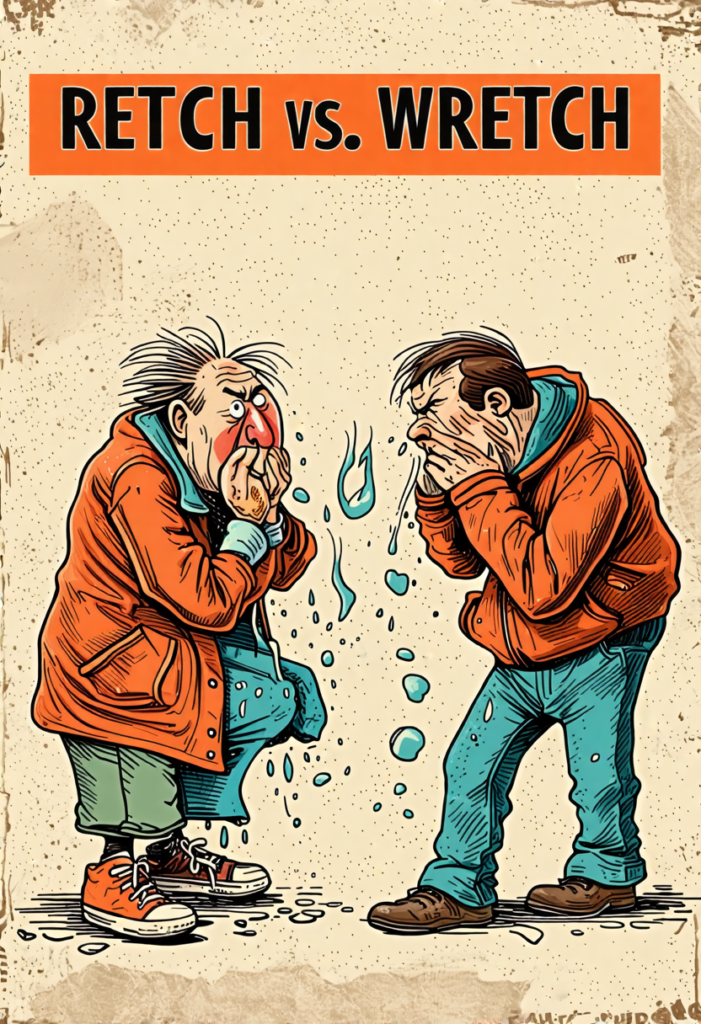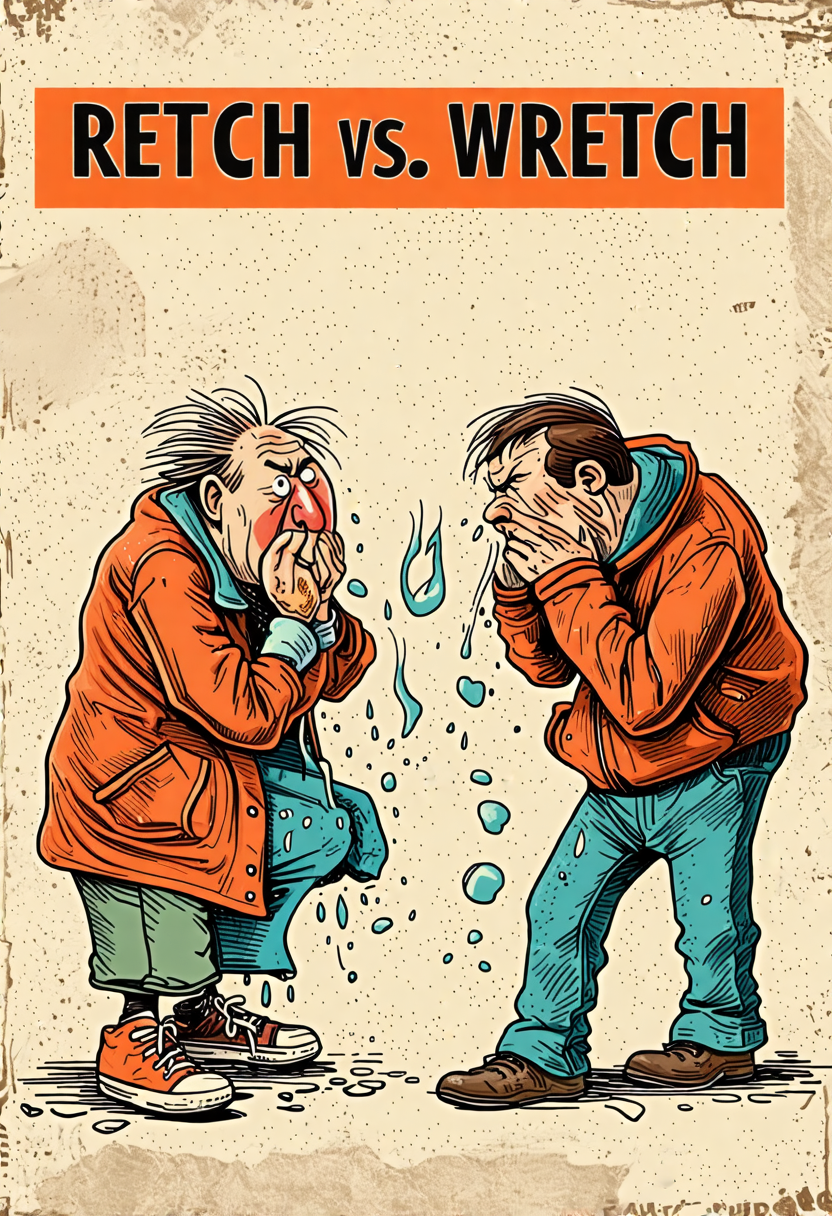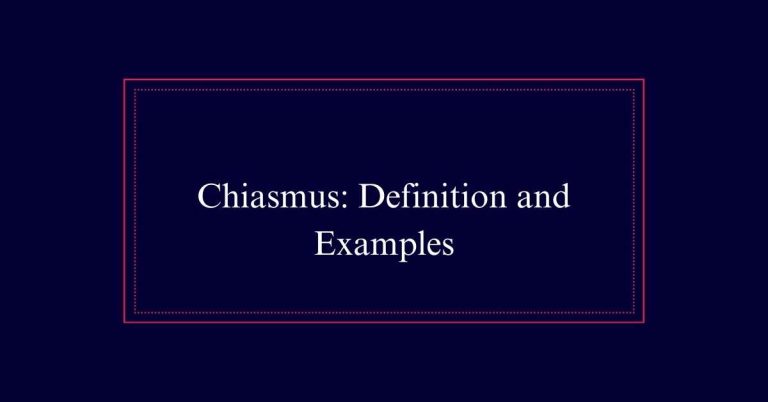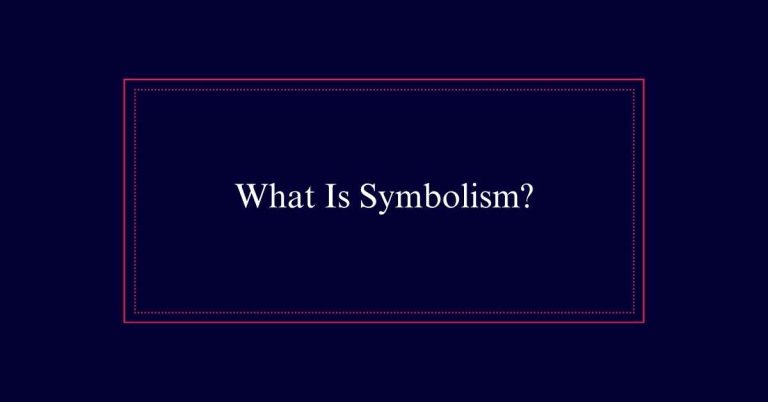Retch vs. Wretch: What Is the Difference?
‘Retch’ and ‘wretch’ have distinct meanings and should not be confused. ‘Retch’ comes from Middle and Old English ‘hræcan’ and refers to the act of vomiting or feeling nauseous. For example, “The foul smell made her retch.” In contrast, ‘wretch’ derives from Old English ‘wrecca’ and describes a miserable or pitiful person. An example is, “The poor wretch looked for shelter.”
Retch: Historical Origins
Retch, a term rooted in Middle English, originates from the Old English word ‘hræcan.’ This early linguistic evolution reflects the word’s long-standing association with the act of vomiting.
The Old English ‘hræcan’ aptly described the physical act of expelling stomach contents, a definition that has remained relatively unchanged over centuries.
Linguistically, ‘retch’ maintained its relevance and precision, illustrating the human condition in moments of discomfort or illness. Its historical origins underscore the continuity of language in describing fundamental human experiences.
This consistency demonstrates the endurance of specific terms within the English language, providing a clear example of how ancient words persist in modern usage, retaining both their meaning and relevance through time.
Retch: Definition and Usage
Defined as the act of vomiting or feeling the urge to vomit, ‘retch’ is a term that vividly captures a common human experience. It is rooted in Middle English and derived from Old English.
The word ‘retch’ is used as a verb to describe the physical act of gagging or heaving, often without producing any vomit. It can also be used more broadly to express a strong reaction of disgust or repulsion.
In medical contexts, it describes the body’s reaction to nausea or certain stimuli. Understanding ‘retch’ is essential for clear communication, especially in describing health-related situations or intense emotional reactions. This term remains relevant in both everyday and clinical settings.
Examples of Retch in Sentences
Overeating at the buffet caused him to retch uncontrollably.
The strong smell of spoiled milk made her retch in the kitchen.
After spinning too fast on the amusement park ride, he began to retch.
The sight of the gruesome scene made the detective retch.
Seasickness on the boat trip led several passengers to retch violently.
When the hiker drank contaminated water, he started to retch and feel nauseous.
The intense workout was so strenuous it made him retch.
The doctor warned that the new medication might cause some patients to retch.
Cleaning up after the dog made her retch.
The foul odor from the garbage caused the worker to retch.
The combination of stress and exhaustion made him retch.

Noun Form of Retch
In addition to its use as a verb, ‘retch’ can also function as a noun to describe the act of vomiting. This noun form captures the physical event itself, providing a succinct way to refer to such instances. For example, ‘His sudden retch was alarming.’
When using ‘retch’ as a noun, consider the following contexts:
- Medical Descriptions: Doctors may document a patient’s retch during examination.
- Literary Usage: Authors might describe a character’s retch to convey illness or disgust.
- Everyday Speech: People may casually mention their retch after feeling nauseated.
- Scientific Observations: Researchers could note the retch of subjects in studies on nausea.
Understanding the noun form adds precision to both written and spoken communication.
Wretch: Historical Origins
The term ‘wretch’ finds its roots in Middle English, tracing back to Old English origins. The word evolved from the Old English word ‘wrecca,’ which means an exile or a banished person.
Over time, its meaning shifted to describe someone who is miserable or in a pitiable state. This change reflects the harsh conditions faced by those exiled or outcast in historical times.
The usage of ‘wretch’ expanded in literature and common language, often portraying characters who are unfortunate or morally despicable. Its historical journey from signifying an outcast to a sorrowful individual illustrates the dynamic nature of language.
Understanding this evolution helps clarify the word’s contemporary connotations and enriches our comprehension of historical texts.
Wretch: Definition and Usage
A wretch is typically defined as an unhappy or morally corrupt individual. The term often conveys a sense of deep distress or wickedness. Its usage can be seen in various contexts, from literature to everyday conversation.
Here are four key points to understand about the word ‘wretch’:
- Emotional State: It describes someone experiencing great sorrow or misery.
- Moral Character: It can refer to a person who behaves in a vile or unethical manner.
- Adjective Form: The word ‘wretched’ is derived from ‘wretch,’ indicating poor quality or unhappiness.
- Historical Usage: Historically, it has been used to depict characters in dire situations or of questionable morality.
Understanding these points helps in accurately using ‘wretch’ in communication.
Examples of Wretch in Sentences
Although often seen in literature, the term ‘wretch’ can also be used to describe individuals in real-life situations of misery or moral failure. Here are some examples to illustrate its usage:
| Sentence Example | Context | Explanation |
|---|---|---|
| “The poor wretch was left to fend for himself.” | Describing a person in dire circumstances | Highlights abandonment and hardship |
| She felt like a wretch after lying to her friend. | Expressing personal guilt or shame | Indicates a sense of moral failure |
| “The wretch stole from his own family.” | Condemning a vile action | Defines the person as morally corrupt |
| He looked like a wretch, with torn clothes and a gaunt face. | Visual description of a person in poverty | Emphasizes physical appearance linked to misery |
These examples demonstrate the varied contexts where ‘wretch’ can be applied.
From Wretch to Wretched
‘Wretch’ evolves into ‘wretched’ to describe not just the person, but also their state of being. This transformation highlights the shift from identifying an individual to characterizing their condition. The term ‘wretched’ denotes extreme unhappiness or poor quality, expanding the scope of its root word.
Here are key points about ‘wretched’:
- Emotional State: It describes severe distress or misery.
- Physical Condition: It can refer to something in a poor or deplorable state.
- Moral Judgment: It may imply moral reprehensibility or despicability.
- Usage in Literature: Often used to evoke sympathy or highlight suffering.
Understanding the evolution from ‘wretch’ to ‘wretched’ enriches our comprehension of language nuances and expression.
Common Confusions
Many people often confuse ‘retch’ and ‘wretch’ due to their similar spellings and pronunciations. This confusion is understandable but can lead to significant misunderstandings.
‘Retch’ refers to the act of vomiting or feeling like vomiting. It is often used in medical or casual contexts to describe physical sensations.
On the other hand, ‘wretch’ describes an unhappy or miserable person. It has a more emotional and descriptive usage, often found in literature or discussions about someone’s condition.
The mix-up between these terms can be problematic in both written and spoken communication, leading to sentences that make little sense. Understanding the distinct meanings and contexts of these words is essential for clear and effective communication.
Frequently Asked Questions
Can “Retch” Be Used in a Figurative Sense?
Yes, “retch” can be used figuratively to describe a strong feeling of disgust or revulsion. For instance, one might say, “The sight of the spoiled food made her retch,” even if no physical vomiting occurred.
Are There Synonyms for “Wretch” and “Retch”?
The term “wretch” has synonyms such as “miserable,” “unfortunate,” and “scoundrel.” For “retch,” synonyms include “gag,” “heave,” and “retching.” These words can help clarify meaning and prevent confusion in writing.
How Do Other Languages Differentiate “Retch” and “Wretch”?
Different languages often have distinct words to differentiate ‘retch’ and ‘wretch’. For example, in French, ‘retch’ translates to ‘haut-le-cœur’ (nausea), while ‘wretch’ is ‘misérable’ (miserable person). This prevents confusion.
What Are Common Misspellings of “Retch” and “Wretch”?
Common misspellings of “retch” and “wretch” often include swapping the two terms. For example, “retch” might be misspelled as “wretch” and vice versa. Additionally, “retch” can mistakenly be spelled as “retch” and “wretch” as “wrecth.”
Do “Retch” and “Wretch” Have Related Idioms or Phrases?
“Retch” is commonly used in the phrase “dry retch,” referring to vomiting without expelling contents. Wretch” appears in idioms like “poor wretch,” describing someone in unfortunate circumstances. These idioms highlight their distinct meanings.








